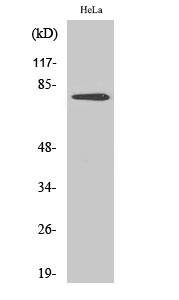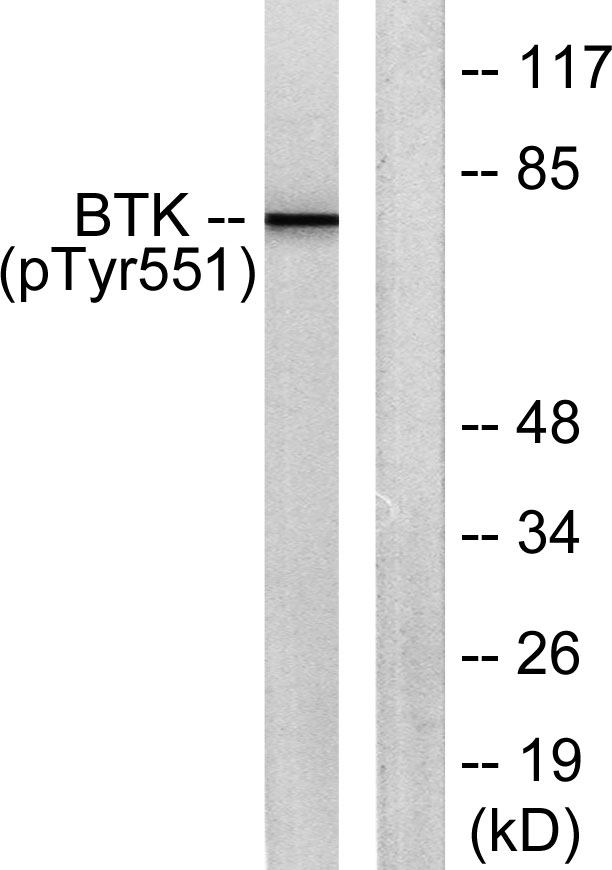- 靶点:
- Btk
- 简介:
- >>NF-kappa B signaling pathway;>>Osteoclast differentiation;>>Platelet activation;>>B cell receptor signaling pathway;>>Fc epsilon RI signaling pathway;>>Epstein-Barr virus infection;>>Primary immunodeficiency
- 基因名称:
- BTK
- 蛋白名称:
- Tyrosine-protein kinase BTK
- Human Gene Id:
- 695
- Human Swiss Prot No:
- Q06187
- Mouse Gene Id:
- 12229
- Mouse Swiss Prot No:
- P35991
- 免疫原:
- The antiserum was produced against synthesized peptide derived from human BTK around the phosphorylation site of Tyr551. AA range:516-565
- 特异性:
- Phospho-Btk (Y551) Polyclonal Antibody detects endogenous levels of Btk protein only when phosphorylated at Y551.
- 组成:
- Liquid in PBS containing 50% glycerol, 0.5% BSA and 0.02% sodium azide.
- 来源:
- Polyclonal, Rabbit,IgG
- 稀释:
- WB 1:500 - 1:2000. ELISA: 1:40000. Not yet tested in other applications.
- 纯化工艺:
- The antibody was affinity-purified from rabbit antiserum by affinity-chromatography using epitope-specific immunogen.
- 浓度:
- 1 mg/ml
- 储存:
- -15°C to -25°C/1 year(Do not lower than -25°C)
- 其他名称:
- BTK;AGMX1;ATK;BPK;Tyrosine-protein kinase BTK;Agammaglobulinaemia tyrosine kinase;ATK;B-cell progenitor kinase;BPK;Bruton tyrosine kinase
- 实测条带:
- 80kD
- 背景:
- The protein encoded by this gene plays a crucial role in B-cell development. Mutations in this gene cause X-linked agammaglobulinemia type 1, which is an immunodeficiency characterized by the failure to produce mature B lymphocytes, and associated with a failure of Ig heavy chain rearrangement. Alternative splicing results in multiple transcript variants encoding different isoforms. [provided by RefSeq, Dec 2013],
- 功能:
- catalytic activity:ATP + a [protein]-L-tyrosine = ADP + a [protein]-L-tyrosine phosphate.,cofactor:Binds 1 zinc ion per subunit.,disease:Defects in BTK are the cause of X-linked agammaglobulinemia (XLA) [MIM:300755]; also called X-linked agammaglobulinemia type 1 (AGMX1) or immunodeficiency type 1 (IMD1). XLA is a humoral immunodeficiency disease which results in developmental defects in the maturation pathway of B-cells. Affected boys have normal levels of pre-B-cells in their bone marrow but virtually no circulating mature B-lymphocytes. This results in a lack of immunoglobulins of all classes and leads to recurrent bacterial infections like otitis, conjunctivitis, dermatitis, sinusitis in the first few years of life, or even some patients present overwhelming sepsis or meningitis, resulting in death in a few hours. Treatment in most cases is by infusion of intravenous immunoglobulin.,
- 细胞定位:
- Cytoplasm. Cell membrane; Peripheral membrane protein. Nucleus. In steady state, BTK is predominantly cytosolic. Following B-cell receptor (BCR) engagement by antigen, translocates to the plasma membrane through its PH domain. Plasma membrane localization is a critical step in the activation of BTK. A fraction of BTK also shuttles between the nucleus and the cytoplasm, and nuclear export is mediated by the nuclear export receptor CRM1.
- 组织表达:
- Predominantly expressed in B-lymphocytes.
Tatarinan N inhibits osteoclast differentiation through attenuating NF-κB, MAPKs and Ca2+-dependent signaling. INTERNATIONAL IMMUNOPHARMACOLOGY Int Immunopharmacol. 2018 Dec;65:199 WB Mouse bone marrow mononuclear cells (BMMs)
货号:YP0288
Tatarinan T, an α‐asarone‐derived lignin, attenuates osteoclastogenesis induced by RANKL via the inhibition of NFATc1/c‐Fos expression. CELL BIOLOGY INTERNATIONAL Cell Biol Int. 2019 Dec;43(12):1471-1482 WB Mouse Bone marrow monocytes (BMMs)
货号:YP0288
- June 19-2018
- WESTERN IMMUNOBLOTTING PROTOCOL
- June 19-2018
- IMMUNOHISTOCHEMISTRY-PARAFFIN PROTOCOL
- June 19-2018
- IMMUNOFLUORESCENCE PROTOCOL
- September 08-2020
- FLOW-CYTOMEYRT-PROTOCOL
- May 20-2022
- Cell-Based ELISA│解您多样本WB检测之困扰
- July 13-2018
- CELL-BASED-ELISA-PROTOCOL-FOR-ACETYL-PROTEIN
- July 13-2018
- CELL-BASED-ELISA-PROTOCOL-FOR-PHOSPHO-PROTEIN
- July 13-2018
- Antibody-FAQs
- 产品图片

- Western Blot analysis of various cells using Phospho-Btk (Y551) Polyclonal Antibody

- Enzyme-Linked Immunosorbent Assay (Phospho-ELISA) for Immunogen Phosphopeptide (Phospho-left) and Non-Phosphopeptide (Phospho-right), using BTK (Phospho-Tyr551) Antibody

- Western blot analysis of lysates from HeLa cells treated with H2O2 100uM 30', using BTK (Phospho-Tyr551) Antibody. The lane on the right is blocked with the phospho peptide.



